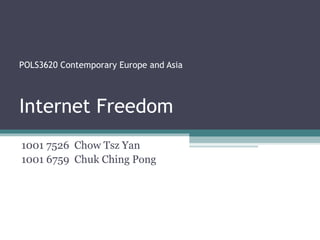
POLS 3620 Internet freedom
- 1. POLS3620 Contemporary Europe and Asia Internet Freedom 1001 7526 Chow Tsz Yan 1001 6759 Chuk Ching Pong
- 2. Introduction • 2012: nearly 1/3 of the world’s population has used the Internet • even greater portion possesses a mobile phone • Concerned with the power of new technologies to catalyze political change • many authoritarian states have taken various measures to filter, monitor, or otherwise obstruct free speech online
- 3. Freedom on the Net 2012 • Conducted by the Freedom House • U.S.-based (NGO) that conducts research and advocacy on democracy, political freedom and human right
- 4. Examination of three broad categories: • A. Obstacles to Access: assesses infrastructural and economic barriers to access • B. Limits on Content: examines filtering and blocking of websites • C. Violations of User Rights: measures legal protections and restrictions on online activity
- 5. Standards of Measurement • 0 (the most free) to 100 (the least free) • Status designation: -Free (0-30 points) -Partly Free (31-60 points) -Not Free (61-100 points)
- 8. Scores of Europe & U.S.
- 10. Recent development • A significant uptick in citizen activism related to internet freedom, which has produced several notable mobilization efforts and legislative victories. • In several European countries, fierce public opposition to the Anti-Counterfeiting Trade Agreement (ACTA) has prompted governments to step away from ratification of the treaty
- 11. • In largely democratic settings, the courts have started to play an instrumental role in defending internet freedom and overturning laws that may infringe on it. • Hungary: Constitutional Court decided in 2011 that the country’s restrictive new media regulations would not be applicable to online news sources and portals. • South Korea: the Constitutional Court issued its third decision favorable to internet freedom in two years, ruling against the real-name registration system
- 12. Key Trends
- 13. New Laws Restrict Free Speech and Prompt Arrests of Internet Users • Responding to the rise of user-generated content • laws that are ostensibly designed to protect national security or citizens from cybercrime • but which are so broadly worded that they can easily be turned on political opponent
- 14. • Malaysia: parliament passed an amendment to the 1950 Evidence Act that holds the hosts of online forums, news outlets, blogging services, and businesses providing WiFi responsible for any seditious content posted by anonymous users • Thailand: pressure on intermediaries intensified in May 2012 after a forum moderator for the popular online news outlet Prachatai received a suspended eight-month jail sentence and a fine for not deleting quickly enough an anonymous reader’s criticism of the royal family • China: private companies maintaining whole divisions responsible for monitoring and interpreting daily Communist Party directives
- 15. Surveillance Increases, with Few Checks on Abuse • Many governments are seeking less visible means to infringe upon internet freedom • often by increasing their technical capacity or administrative authority to access private correspondence • Governments enhanced their surveillance abilities • E.g. South Korea, Thailand
- 16. • Surveillance in nondemocratic countries is often political in nature, aimed at identifying and suppressing government critics and human rights activists. • In China, major microblogging services were given a March 2012 deadline to implement real- name registration for their users
- 17. • Even in more developed democracies, concerns have increased that the government is becoming too intrusive • Britain: In 2012, the government announced a proposal to expand the existing surveillance measures
- 18. China’s Case
- 19. The Chinese method for controlling social- media content • restricting access to international networks while coercing their domestic alternatives to robustly censor • monitor user communications according to Communist Party directives—has become a particularly potent model for other authoritarian countries. • attempts to enhance their technical capacity to censor, monitor, or carry out cyberattacks against regime opponents.
- 21. Historical and Cultural Perspective
- 22. Historical perspective • Rejection to ‘digital revolution’ , especially in the Cold War era • “ double juggernaut “ of China since 1990s - China’s reform & an era of rapid technological innovations globally • Linear development vs dramatic change
- 23. Cultural difference • Western domination of software industry - reasons behind like openness , free expression , democracy , competitive market , etc • China with similar software and internet advancement - under fully government surveillance and manipulation
- 24. Conclusion “Technology will make it increasingly difficult for the state to control the conformation its people receive … The Goliath of totalitarianism will be brought down by the David of the microchip .” ─ Ronald Reagan , speech at London’s Guildhall , June 14 , 1989 “Imagine if the Internet took hold in China . Imagine how freedom would spread .” ─ George W . Bush , Phoenix , Arizona , December 7 , 1999
- 25. Bibliography • Freedom House, "Freedom on the net 2012." Accessed November 13, 2012. http://www.freedomhouse.org/report/freedom-net/freedom-net-2012. • Kalathil, Shanthi , and Taylor C. Boas . 2003 . Open Networks , Closed Regime : The Impact of the Internet on Authoritarian Rule . Washington : The Brookings Institution press . • Herold, David Kurt and Peter Marolt. 2011. Online Society in China :Creating, Celebrating, and Instrumentalising the Online Carnival. Media, Culture and Social Change in Asia. Vol. 25. Abingdon, Oxon; New York: Routledge. • Simon, Leslie David, Javier Corrales, and Donald R. Wolfensberger. 2002. Democracy and the Internet :Allies Or Adversaries?. Wilson Forum. Washington, D.C.: Woodrow Wilson Center Press.
Notas del editor
- a comprehensive study of internet freedom in 47 countries around the globe. This report is the third in its series and focuses on developments that occurred between January 2011 and May 2012